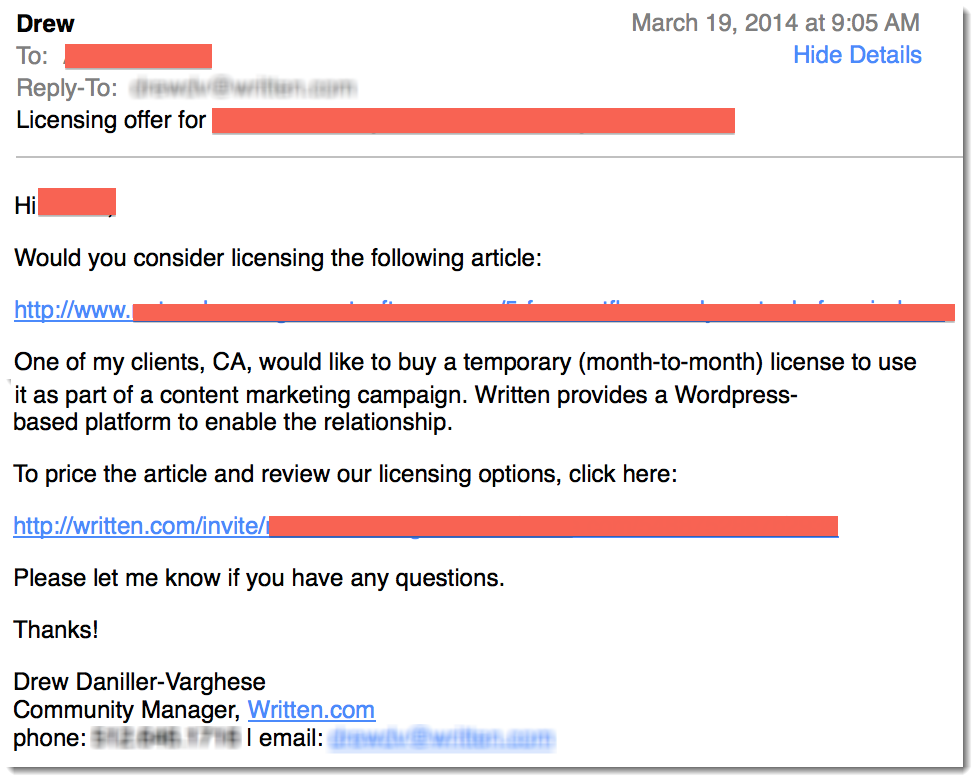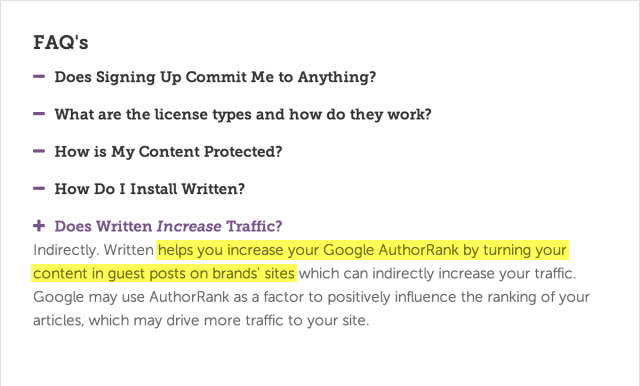Flip Guest Blogging on its Head, With Steroids
Guest blogging was once considered a widely recommended white hat technique.
Today our monopoly-led marketplace arbitrarily decided this is no longer so.
Stick a fork in it. Torch it. Etc.
It looks like MyBlogGuest was the "winner" - not appearing on branded terms RT @mattcutts Today we took action on a large guest blog network— Rae Hoffman (@sugarrae) March 19, 2014
Now that rules have changed ex post facto, we can expect to deal with a near endless stream of "unnatural" link penalties for doing what was seen at the time as being:
- natural
- widespread
- common
- low risk
- best practice
Google turns your past client investments into new cost centers & penalties. This ought to be a great thing for the SEO industry. Or maybe not.
As Google scares & expunges smaller players from participating in the SEO market, larger companies keep chugging along.
Today a friend received the following unsolicited email:

Curious about their background, he looked up their past coverage: "Written then offers a number of different content licenses that help the advertiser reach this audience, either by re-branding the existing page, moving the content to the advertiser’s website and re-directing traffic there, or just re-publishing the post on the brand’s blog."
So that's basically guest blogging at scale.
And it's not only guest blogging at scale, but it is guest blogging at scale based on keyword performance:
"You give us your gold keywords. Written finds high-performing, gold content with a built-in, engaged audience. Our various license options can bring the audience to you or your brand to the audience through great content."
What's worse is how they pitch this to the people they license content from:

I'm sorry, but taking your most valuable content & turning it into duplicate content by syndicating it onto a fortune 500 website will not increase your traffic. The fortune 500 site will outrank you (especially if visitors/links are 301 redirected to their site!). And when visitors are not redirected, they will still typically outrank you due to their huge domain authority (and the cross-domain rel=canonical tag), leading your content on your site to get filtered out of the search results as duplicate content & your link equity to pass on to the branded advertiser.
And if Google were to come down on anyone in the above sort of situation it would likely be the smaller independent bloggers who get hit.
This is how SEO works.
Smaller independent players innovate & prove the model.
Google punishes them for being innovative.
As they are punished, a vanilla corporate tweak of the same model rolls out and is white hat.
In SEO it's not what you do that matters - it's who your client is.
If you're not working for a big brand, you're doing it wrong.




Comments
On one of Written's pages, they have this nugget: "This license allows the brand to reprint the content on the brand's blog but does not move traffic. Written.com ensures proper attribution including a rel=canonical tag which ensures that search engines perceive the licensed copy as a syndicated copy."
When they say the licensed copy, do they mean the copy that appeared on the original publishers site? And if so, do you think Google would ignore this tag if the content was republished on domains repping DA's of 80 and above?
... this piece states:
If they are "delivering the audience" to the brand licensing the content, that would suggest the rel=canonical flows into the branded site.
For confirmation, one could download their Wordpress plugin from here & see on line 270
then on lines 294 & 295
so they are absolutely giving themselves the ability to both canicalize & 301 the existing link equity from the blogger's blog post to point it into the brand advertiser's pages. Pretty risky combining both bulk guest posts & a paid link network so overtly.
I'd love to see what the spike in disavows looks like over the next week or two. What does this mean for websites who published content from MBG? There are a significant number of well-known, <20K Alexa blogs who make/made offers on content from there. What happens when noob webmasters disavow those domains? A comprehensive manual review of all linking "intentions?" :p
Interesting article, Aaron. Thanks for being one of the few SEO commentators out there bringing the truth and being willing to criticize Google and their double standards.
Well at least MBG can still "pay" for traffic from Google, I'd be curious as to how much Google nets for each site they torch.
It seems from the begining that Guest blogging won't last for long as it was abused, and people publish nonsense for the sake of a link. ,And Google hates this, and it decided to soffocate it, as it did with article submission.
Hasn't Google created these problems?
I read somewhere that less than half of the world's 7 Billion people are online currently. Of those 3 1/2 billion people online how many actually search for something using a search engine versus using a supplied link (which could be in an email, on a social site, or a site you frequent, in a guest post, and so on)?
Factor in that Google gets about 70% of all searches in the USA and the important words are 'All Searches' not all users.
Most 'guest bloggers' are writing what I would call a lead in article that has links directing the READER not search engines to the full article most likely on their site.
Google wants 'unique' content and thus this 'guest blogger' that wrote both an excellent article and lead in article now has to spin the lead in article for distribution which of course destroys its quality and can make it impossible for the reader to understand.
If Google were to drop their nonsense of uniqueness and not penalize a 'guest blogging' site for having duplicate content I believe the quality would rise, and the reader would be better served. Afterall it is poor thinking to assume that every reader visits every website just to read each 'guest blog post', so why not allow quality lead in articles that are identical on different blogs as they most likely do not get the same visitors / readers on each.
Hey Aaron - I'm a longtime reader of seobook and with respect to you and your work, I wanted to clarify a few details about Written.
I composed a page and posted it to written.com to give it a little more credibility. (So you would know it came from us and not some random person pretending to represent our company.)
http://written.com/faq-duplicate-content-and-guest-blogging/
I'm happy to answer any questions you have about Written. You can email me at josh@written.com or call my mobile 512-524-7755.
On a side note, based on the social stats, this is probably a $1200 a month blog article. Want to talk about licensing it? ;-)
...I'm not a programmer, but a friend who looked at the plugin for bloggers said it looked like the 301s may have flown in the other direction to where the bloggers link equity is 301ed into the brand site which is syndicating the content. Are you suggesting the bloggers never have their articles 301ed to the brand sites?
Add new comment